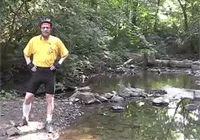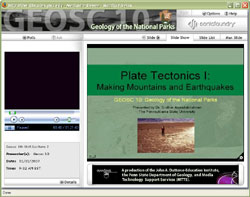 Home
Home

Course Authors: Dr. Richard Alley and Dr. Sridhar Anandakrishnan
 "It would be fun to take a tour of all the national parks, learning
a little about each. But Penn State would not award you General
Education credit for such a course—you are supposed to be taking a
tour of a field of knowledge, in this case geology. So, we will take
a tour of geologic ideas. But, some of the best geological features
of the world are enshrined in the U.S. national parks. We will use
national parks as illustrations, delving into park history and
culture when we can, but concentrating on those things that
illustrate how the Earth works." - Dr. Richard Alley
"It would be fun to take a tour of all the national parks, learning
a little about each. But Penn State would not award you General
Education credit for such a course—you are supposed to be taking a
tour of a field of knowledge, in this case geology. So, we will take
a tour of geologic ideas. But, some of the best geological features
of the world are enshrined in the U.S. national parks. We will use
national parks as illustrations, delving into park history and
culture when we can, but concentrating on those things that
illustrate how the Earth works." - Dr. Richard Alley
Geosc 101 is designed to serve undergraduate non-majors who need to fulfill a General Education requirement and think that learning about the geology of the national parks is just the right way to do it.
Want to hear more? Watch a brief video introduction from Dr. Alley! (Link will open in a new browser window.)
This is a fun course. Our four goals for the course are:
We must do this within the framework of Penn State General Education, by providing a comprehensive view of a recognized subject area (geology and related topics), stimulating critical thinking and cross-disciplinary understanding, etc.
The Department of Geosciences offers two versions of GEOSC 10: one in the classroom, the other on the Web. The use of the World Wide Web permits us to teach beyond the traditional borders of the classroom, and to a wider and more diverse audience. As there are no preset meeting times for the online version, this course is well suited to the needs of those who are struggling with scheduling issues, working students, and adult learners. In the online version, course activities take place on the Web, mostly within the University's online course management system, ANGEL (http://angel.psu.edu). You won't have to log in to the class at any particular time or place, but you are required to keep pace with a weekly assignment calendar. You will communicate with your instructor and with fellow students within ANGEL by threaded discussion (a kind of public email) and course e-mail. You should plan to devote as much time to the course as one would to a traditional 15-week course (8-12 hours per week).
 Weekly lectures are delivered through Mediasite Live, an online video presentation system hosted by Media & Technology Support Services, part of the University Libraries. The required text, Rocking the Parks: Geological Stories of the National Parks, is available on-line through ANGEL at http://cms.psu.edu. It is a short, targeted book. When we have surveyed students, most preferred free over fancy!
Weekly lectures are delivered through Mediasite Live, an online video presentation system hosted by Media & Technology Support Services, part of the University Libraries. The required text, Rocking the Parks: Geological Stories of the National Parks, is available on-line through ANGEL at http://cms.psu.edu. It is a short, targeted book. When we have surveyed students, most preferred free over fancy!
Students are graded on four things in this course:
Extra-credit opportunities will be available at different times throughout the semester. Generally, these opportunities will involve contributing to the course experience for everyone in some way, such as sharing one's own park photos in the form of a "virtual fieldtrip."
|
|
|
| Operating System | Windows 2000, ME, or XP
Macintosh OS X (10.2 or higher) |
| Processor | 500 MHz or higher |
| Memory | 128 MB of RAM |
| Hard Drive Space | 500 MB free disk space |
| Browser | Mac OS X: Firefox 1.0 or higher
Windows: Internet Explorer 6 or higher -OR- Windows: Firefox 1.0 or higher Note: Cookies, Java, and JavaScript must be enabled. AOL users should connect through AOL and then use one of the browsers listed above. |
| Plug-ins | Adobe Reader [Download from Adobe]
Flash Player [Download from Macromedia] |
| Modem | 56 kbps or broadband connection |
| Printer | graphics-capable printer |
| CD-ROM | not required |
| Sound Card and Speakers |
required |
| Monitor | 15" monitor (1024 x 768 resolution) |
This course is offered during the fall and spring semesters each year. If you're interested in enrolling in the Web version of GEOSC 10 and you're a student at the University Park Campus or any of the participating Commonwealth Campuses, register for this course as you would any other class.